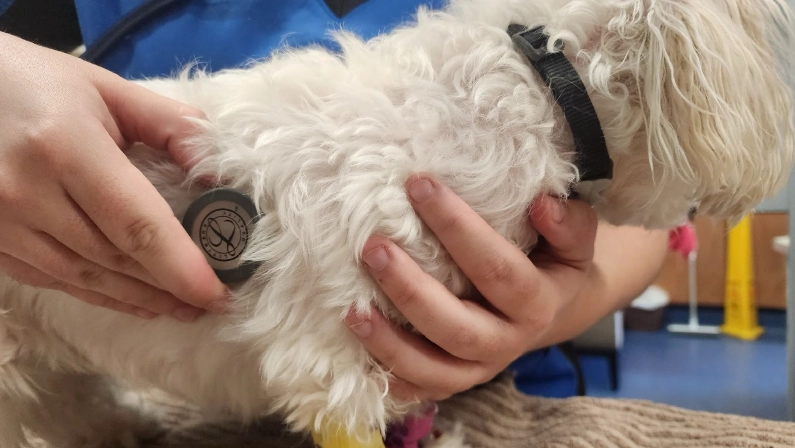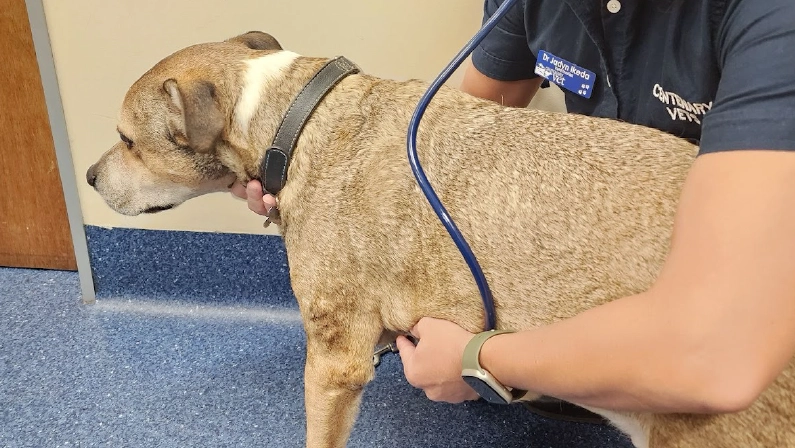Keeping your pet’s heart healthy is one of the most important aspects of their overall well-being. Just like humans, pets rely on a strong cardiovascular system to stay active, energetic, and happy. Without proper care, heart disease can develop silently that leads to serious health concerns that impact their quality of life.
At Centenary Vet, we take a proactive approach to heart care, focusing on nutrition, exercise, and regular check-ups. For pets with existing heart conditions or those at risk, specialist cardiology services provide the right care to manage and improve heart health.
Understanding the key factors that contribute to a healthy heart helps pet owners take the right steps early. By making simple lifestyle adjustments, you can reduce the risk of heart disease, support cardiovascular function, and keep your pet thriving for years to come.
How a Balanced Diet Supports Your Pet’s Heart Health

A well-balanced diet is essential for maintaining heart health in pets. The right combination of nutrients strengthens the heart, regulates blood pressure, and helps lower the risk of heart disease.
Taurine, omega-3 fatty acids, L-carnitine, and coenzyme Q10 support heart function and reduce inflammation. High-quality, vet-approved pet food provides these essential nutrients, while a veterinarian can offer guidance on supplements and dietary adjustments.
Maintaining a healthy weight is just as important for heart health. Excess weight puts additional strain on the heart and affects circulation. Controlling calorie intake and feeding nutrient-dense meals help support an ideal weight and overall well-being.At Centenary Vet, we provide expert guidance on heart-healthy pet nutrition, helping pet owners make informed choices for their companion’s long-term health. Learn more about what to expect during a pet health check to ensure your pet’s overall well-being.
Pets Regular Exercise for a Strong and Healthy Heart
An active lifestyle keeps pets healthy, energetic, and less prone to heart disease. Movement strengthens the heart, improves circulation, and helps maintain a healthy weight. Without enough exercise, pets face a higher risk of obesity, which puts unnecessary strain on the cardiovascular system.
Choosing the Right Exercise for Your Pet
The right type of exercise depends on a pet’s age, breed, energy levels, and overall health. Some pets thrive with high-intensity activities, while others benefit from gentle, low-impact movement to avoid excessive strain.
High-Energy Pets
Certain breeds have naturally high stamina and require more intense cardiovascular workouts to stay fit and mentally engaged. These pets benefit from activities that challenge their endurance and agility, including:
- Agility training – Border Collies, Australian Shepherds, Jack Russell Terriers excel at obstacle courses that improve coordination and heart function.
- Sprinting or hill running – Siberian Huskies, Belgian Malinois, Vizslas thrive with short bursts of speed that build endurance.
- Climbing towers or elevated play – Bengal cats, Abyssinians, and Maine Coons enjoy vertical movement that keeps them agile.
- Fetch or interactive play – Labrador Retrievers, Golden Retrievers, and Poodles love retrieving games that keep their hearts active.
Senior Pets & Pets with Heart Conditions
Older pets and those with joint issues, breathing difficulties, or pre-existing heart conditions require gentler exercises to stay active without overexertion. Safer options include:
- Leisurely walks – Ideal for Bulldogs, Dachshunds, Persian Cats, and senior pets to maintain circulation without strain.
- Gentle swimming – Great for Newfoundlands, Spaniels, and older Retrievers who need low-impact muscle strengthening.
- Puzzle feeders & slow-paced play – Helps indoor cats, older dogs, and brachycephalic breeds like Pugs and Shih Tzus engage in light activity without overexertion.
Monitoring Your Pet’s Activity
Signs of overexertion, such as excessive panting, coughing, or fatigue, indicate that an exercise routine may need adjustment. A veterinarian like Centenary Vet can recommend safe, tailored exercise plans that support heart health while keeping pets fit and comfortable.
Why Routine Veterinary Check-Ups Matter
Regular veterinary visits play a crucial role in detecting heart conditions early. Many heart diseases develop silently, with no visible symptoms until they reach an advanced stage. Routine check-ups allow veterinarians to identify early warning signs, helping pets receive treatment before serious complications arise.
Why Regular Vet Visits Are Essential
Routine health screenings help identify heart murmurs, irregular heartbeats, and breathing difficulties that may indicate underlying heart disease. Detecting these issues early allows for better treatment options and improved long-term outcomes.
Key Diagnostic Tests for Heart Health
Veterinarians use specialised diagnostic tools to assess heart function and detect abnormalities, including:
- Electrocardiograms (ECGs) – Measures electrical activity to identify irregular heart rhythms.
- X-rays – Provides a clear image of heart size and lung health.
- Ultrasounds (Echocardiograms) – Evaluates heart structure and blood flow in real time.
- Blood Tests – Detects signs of heart-related conditions, such as high biomarkers linked to cardiac disease.
Breed-Specific Risks & Preventive Measures
Certain breeds have a higher predisposition to heart disease, making preventative care even more critical:
- Cavalier King Charles Spaniels – Prone to mitral valve disease, a progressive heart condition.
- Dobermanns – Have a higher risk of dilated cardiomyopathy (DCM), a condition that weakens the heart muscle. Alternative treatment options for DCM in Dobermanns discuss emerging therapies that may help slow disease progression and support heart function.
- Maine Coon Cats – Susceptible to hypertrophic cardiomyopathy (HCM), which thickens heart walls and affects blood flow.
Regular check-ups help monitor at-risk breeds and implement early interventions to manage heart health effectively.
Recognising Symptoms of Heart Disease in Pets
Heart disease in pets often develops gradually, with symptoms appearing as the condition progresses. Early detection allows for better management, improving long-term outcomes.
Signs That May Indicate Heart Issues
Certain symptoms can signal potential heart problems, but they may also be linked to other conditions. If a pet displays any of the following, a veterinary evaluation is recommended:
- Coughing – Persistent, worsens at night or after lying down, or sounds dry and hacking. May indicate fluid buildup in the lungs, airway irritation, or an enlarged heart pressing on the trachea.
- Abdominal Swelling (Bloating) – Can result from fluid retention, sometimes associated with congestive heart failure.
- Fainting or Weakness – Sudden collapse, especially after activity, may suggest irregular heartbeats (arrhythmia) affecting blood circulation.
- Open-Mouth Breathing – In cats, this is unusual and may signal respiratory or circulatory distress.
- Increased Breathing Rate at Rest – A noticeable rise in resting breaths (more than 30-40 breaths per minute in a relaxed state) can be a sign of heart strain.
Since these symptoms aren’t exclusive to heart disease, a veterinary assessment is essential to determine the cause and appropriate treatment.
Common Heart Conditions in Pets
Several cardiac conditions affect pets, with some being breed-specific:
- Mitral Valve Disease (MVD) – A leading cause of heart failure in small-breed dogs, caused by valve deterioration.
- Dilated Cardiomyopathy (DCM) – Affects large-breed dogs, weakening the heart muscle and reducing its pumping ability.
- Congenital Abnormalities – Structural heart defects present at birth, such as patent ductus arteriosus (PDA).
- Heart Arrhythmia – Irregular heartbeats that can lead to fainting and reduced blood circulation.
What to Do If Your Pet Shows Symptoms
If a pet exhibits signs of heart disease, take immediate action:
- Reduce Activity – Minimise stress and movement to prevent overexertion.
- Check Breathing Rate – Count breaths per minute at rest; increased rates may indicate fluid buildup.
- Monitor Symptoms – Note when symptoms occur (e.g., after exercise, while resting).
- Seek Veterinary Care – A vet will perform diagnostic tests such as X-rays, ECGs, and echocardiograms to assess heart health.
How Weight Management Plays a Vital Role in Your Pet’s Heart Health
Maintaining a healthy weight is essential for reducing the risk of heart disease in pets. Extra weight puts strain on the heart, increases the likelihood of hypertension (high blood pressure), and contributes to reduced mobility and overall health complications.
How Obesity Increases Heart Disease Risk
Pets carrying excess weight require their hearts to work harder to circulate blood, leading to:
- Increased Blood Pressure (Hypertension) – Forces the heart to pump against higher resistance, raising the risk of heart failure.
- Reduced Exercise Tolerance – Less physical activity leads to further weight gain and worsens cardiovascular strain.
- Higher Risk of Diabetes & Organ Damage – Obesity is linked to metabolic disorders that further impact heart function.
According to research on obesity and heart disease in pets, excess weight contributes to cardiac remodeling, increased heart workload, and a higher likelihood of heart failure in overweight pets.
Setting a Healthy Weight Target for Your Pet
Keeping pets at an ideal weight lowers stress on the heart and improves overall health. Ways to monitor and manage weight at home include:
- At-Home Weight Checks – Feel for ribs under a light fat covering; excess fat may signal weight gain.
- Calorie Restriction – Adjust portions based on vet recommendations and reduce excessive treats.
- Portion Control – Use measured meals rather than free feeding to maintain a steady weight.
A veterinarian can assess your pet’s weight and recommend a tailored diet and activity plan to ensure optimal heart health.
Healthy Alternatives to High-Calorie Treats
Many commercial pet treats are high in fats and sugars, contributing to weight gain. Swapping unhealthy snacks for nutrient-dense options supports pet weight management:
- Carrot sticks, cucumber slices, or apple slices – Low in calories, high in fiber.
- Lean proteins (boiled chicken, turkey, or fish in moderation) – Provides essential nutrients.
- Commercial low-calorie treats – Designed for weight-conscious diets while still enjoyable for pets.
Switching to healthier alternatives helps prevent obesity-related heart disease while keeping pets satisfied and energised.
Keeping Your Pet’s Heart Healthy
A combination of balanced nutrition, regular exercise, routine veterinary check-ups, and weight management plays a critical role in preventing heart disease in pets. Small lifestyle adjustments make a significant impact on long-term health, ensuring pets remain active and happy.
Take Action: Prioritise Your Pet’s Heart Health
Scheduling regular veterinary heart health check-ups allows for early detection of issues, helping pets live longer, healthier lives. Book a heart health assessment with Centenary Vets to receive expert guidance on preventing heart disease and improving your pet’s overall well-being.



